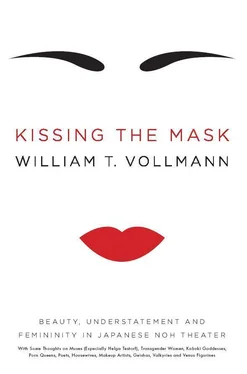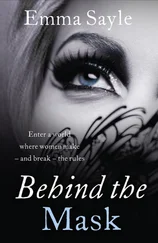“My twin sister and I have all the same DNA and upbringing and friends,” Hilary continued, “but we just came into this world with different souls. I feel my soul is my essence which allows me to I feel that I’m very at ease. I think that my soul is an old soul, poetic. I have a grace that’s come through lifetimes, of acceptance. My sister’s a little more anxious.”
“Could you have been a man in a past life?”
“Absolutely.”
“So for you the soul is not gendered.”
“The soul is not gendered, because it’s undefinable life-force which is the great mystery. It’s in the decision of these molecules to maintain shape, to maintain the agreement to be , to retain the life-force. In some source I feel that we can’t really separate that energy from life. I love that there’s a great mystery and I don’t want to figure it out.”
(Recall Zeami: “As long as the character is mysteriously beautiful, whatever is done should be interesting.”)
“Now for the second question,” I said. “Who are you as a person?”
“I am a social butterfly, very outgoing. Friendship is really one of my highest priorities. I am easygoing and fun-loving, but I am also fiercely loyal and definitely community-minded. My lasting philosophy is that I like everyone until they’ve proven themselves otherwise. My sister’s the opposite. I have an optimistic outlook.”
“To what extent does gender influence your personality?”
“I think gender is in the chemical makeup of girl versus boy. I am happy to be a girl and take that on. My nephew is such a little ball-throwing kind of boy, and my niece is such a little girlie-girl, and I love that. But I feel like at my age I was almost unfairly influenced by being a girl. I really admire women who are so kickass at gender roles. I allowed myself to get off easy because I was a girl. I didn’t have to apply smarts to get by, because I was just acceptable and sociable and cute. I do really value the ten percent that’s genderless, but I am ninety percent girl. I am not a natural athlete, although I’ve rock climbed and skied. I would enjoy an opportunity to be a boy and since I live in San Francisco, I don’t think I’d have to change my persona all that much. The boy I love is a very sensitive man. I could date girls. That’s always fun! I think I could be a boy and still be me. I do play kind of a mother role in my community. I don’t know if that would have to be regendered. I guess I could be a Papa. I think that element of nurturing is natural for me.
“I feel at a disadvantage as a woman, because society encourages me to be a giver instead of a receiver. My Mom was definitely a fifties woman. 2But then again, my older sister who’s ten years older than I, is a breadwinner and her husband is a stay-at-home man. So I can’t really say it’s strictly society or strictly family. And I am single and have always taken care of myself. And I wouldn’t expect anyone to do that for me. I’m not saying I would turn it down necessarily but I want to feel that I can stand on my own two feet regardless. As far as the boy I love is concerned, I think that I have to prove my independence every day, and yet I really love interdependence and I want him and me to be there for each other. If I had gotten married younger, I would not have that feeling. But as a single woman I don’t want to be considered that desperate, shopping for a man. I think it’s more the way I appear to other women that concerns me.”
One quality which marked Hilary as an early-twenty-first-century American woman was her gender-anger. When I asked her to compare male and female behavior, her descriptions of the former were invariably critical. It was not that she herself was angry; in fact she was a very sweet person. I asked her if she could think of any positive aspects of the male gender, and she replied: “We all have brothers. We all have fathers who are family members. I do think that testosterone does inform the violence in this world, but I don’t have an animosity toward the men in this world. The nurturing of men has been unfair in that they seek solace in violence and power instead of in art and soul.”
She paused and added: “But I trust the men in my world to be humans just like me — not to say that men don’t frustrate me.”
This assertion of support for the qualities of my sex seemed to me lukewarm, at least in comparison to the support I would have expressed for femininity; and I liked her and wanted there to be symmetry between us, so a few moments later I rephrased the question and asked it again, as well as I could without actually leading or forcing her.
“Well,” said Hilary, “there’s a fearlessness, a natural inclination to be more active and athletic, also more of an encouragement to be self-sufficient and self-reliant.”
But in her next breath the anger came out again, in however a mild and covert a form, when she said: “And I do think there’s kind of a birthright to being a male, that you inherit the world, but that’s societal, and I don’t think that’s true of all males, just of white males.”
She then went on in a more conciliatory fashion: “I think there’s nothing more admirable or enviable than being like a rock star, just having that confidence of thinking you can be a surfer, skier, ladykiller, just have it all. But I do think there are women like that, too, who have it all, just not as many. But I think there are great advantages to being a woman. I traveled alone for ten months and I did take advantage; it was easier for people to offer generosity or comfort to me. People weren’t scared of me, so they’d take me in. And they did take me in, all across the world. On the dating front, I think that men are definitely more conflicted around the concept of pairing up, because they definitely do feel a prowess around the more the merrier, and they feel encouraged to seek that power and see it as a weakness to choose loyalty over quantity. I think that men have more of an intrinsic fear about coupling than I do. Maybe it’s a fear of intimacy that they mask by being out on the town. I pinpoint it perhaps to separation from Mother. I’m thinking of a certain male friend who epitomizes the idea of a loner getting laid. I think that men can kind of separate the sexual urge from the emotional, and women can’t.”
Another of Hilary’s American qualitites: She believed that relationships can and should be negotiated. — “I think that basically men and women have to agree,” she said. “You have to be comfortable with the fact that you’re mutually fulfilled, or nearly. You just have to come to the relationship with an agreement about money, sex, and alcohol or drugs.”
She had been in one three-year relationship which she described as follows:
“We didn’t have a very good sex life but we had an okay love life. The less sex we had, the less we needed. We were very affectionate and cuddly and sweet. But we had different hours.”
“To what extent do you think that desire differences in a relationship are the simple result of the fact that any two people are different, and to what extent do you see them as deriving from some sort of difference or even incompatibility between man and woman?”
“I thought that living with these lesbian girls was going to be, what a joy not to deal with that ! — but they had the exact same fits and jealousies, so a lot of it is just specific to two unique people! But I do think that part of the joy in a male-female relationship is crossing the abyss.”
That abyss, and the other on its far side, as haunting as a pagoda’s shape in the night, how can I hope to describe them? Crossing changes the crosser unforeseeably, as we read even in the ancient epic of Gilgamesh, when the beasts of the desert reject the wild man as soon as he has taken the harlot in his arms and murmured love to her; “now you have become like a god.” Later on, when this tamed hero lies in agony on his deathbed, we learn that it was not the sexual act in and of itself which altered him, for in the desert mountains he had had a wife. The cause must therefore be the harlot’s beauty and grace.
Читать дальше












